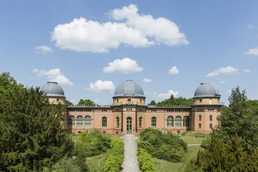Excursions
On Wednesday 7 September from 13:00 to approx. 17:30, several excursions will take place to institutes of scientific interest in and around Berlin. Conference participants can register themselves for one of these excursions at the registration desk fom Sunday 4 September to Tuesday 6 September. The following excursions can be booked free of charge:
1) A visit to the Potsdam Institute for Climate Impact Research (PIK), Telegraphenberg A 31, 14473 Potsdam
The historic buildings of the PIK and its high-performance computer are located on Potsdam’s Telegraphenberg campus. Here, researchers in the natural and social sciences from all over the world work closely together to study global change and its impacts on ecological, economic and social systems. Researchers examine the earth system's capacity for withstanding human interventions and devise strategies and options for a sustainable development of humankind and nature.
During this excursion, several research projects relevant to the themes of the AITVM-STVM conference will be presented, and participants will receive a guided tour of the Telegraphenberg campus.
2) A visit to the Leibniz Centre for Agricultural Landscape Research (ZALF), Eberswalder Straße 84, 15374 Müncheberg
ZALF's mission is to scientifically explain causal relationships in agricultural landscapes, and to provide society with a knowledge-base for the sustainable use of agricultural landscapes through excellent research. Unlike natural landscapes, agricultural landscapes are shaped by their use and their users. The research at ZALF therefore comprises the social demands placed on agri-cultural landscapes and the effects of their use. ZALF has been increasingly concentrating its research on the Grand Societal Challenges relevant in the context of agricultural landscapes such as climate change, food security or the protection of biodiversity.
The program for this excursion consists of a visit to the ZALV facilities and presentation of projects relevant to the themes of the AITVM-STVM conference.
3) A visit to the Department of Veterinary Medicine, Freie Universität Berlin, Campus Düppel, Oertzenweg 19b, 14163 Berlin
Of the five sites of training in veterinary medicine in Germany, Berlin can look back on a unique history of veterinary medicine stretching back to the founding of the original school in 1790. In 1992, the faculties of the Humboldt-Universität zu Berlin and those of Freie Universität Berlin were combined. Most of the institutes and clinics are since located on the spacious grounds of the former Düppel estate. A guided tour to the different institutes and clinics at campus Düppel will be given.
4) A visit to the Museum für Naturkunde, Invalidenstr. 43, 10115 Berlin
The Museum für Naturkunde - Leibniz Institute for Evolution and Biodiversity Science is an integrated research museum within the Leibniz Association. It is one of the most important research institutions worldwide in the areas of biological and geological evolution and biodiversity. Alongside knowledge transfer, research and the collections are the main pillars of the Museum’s work. The collections comprise over 30 million items covering zoology palaeontology, geology and mineralogy and are of highest scientific and historical importance.
The permanent exhibitions and the regular special exhibitions give the public an insight into current research at the Museum. Current highlights include the display of Tristan Otto, one of the best preserved Tyrannosaurus rex skeletons worldwide and the world's tallest standing dinosaur (Brachiosaurus brancai) skeleton.

